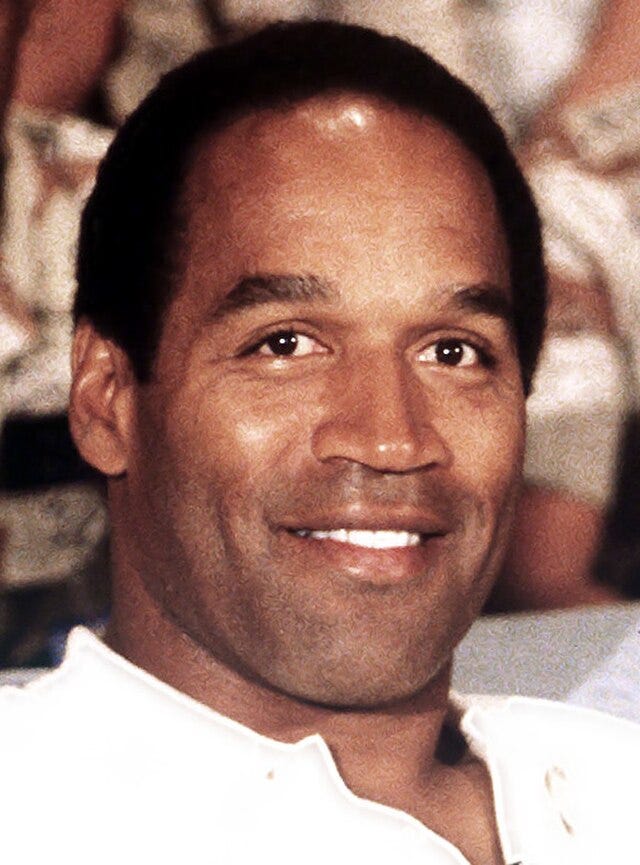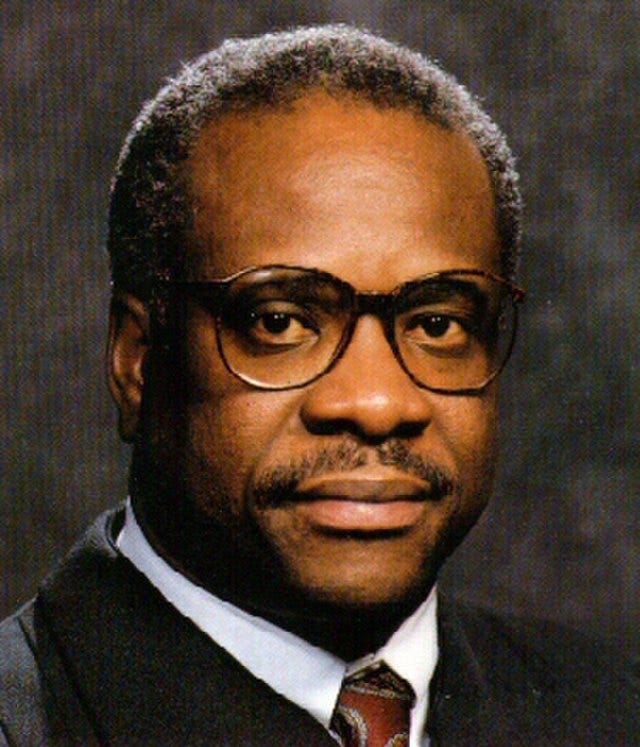O.J. Simpson and Clarence Thomas: Two Peas in a Pod
Spiritual brothers, they played the race card to the hilt.


My gut reaction to the news about the recent death of O.J. Simpson was simple: about time. Not to sound cold-hearted, but why pretend anyone is sorry that a man who murdered two people in cold blood, then went scot-free to live to the reasonably ripe age of 76, is no longer among us?
If you’re of a certain age, you likely remember exactly where you were when you learned the 1995 verdict in Simpson’s trial for the murder of his former wife Nicole Brown Simpson and her friend Ronald Goldman. I was driving along the bucolic hills of North Carolina when I heard the verdict on the radio. I was so jolted by the announcement that I had to pull my car along the side of the road to get a grip.
But as I reflect on Simpson’s trial and verdict, I can’t help but think of Clarence Thomas. To me, they’re spiritual brothers. Both played the race card in ways brilliant and ruthless, preying on America’s insecurity about race to reach their ultimate goals—a position on the Supreme Court for Thomas and an acquittal for Simpson. Neither was a friend or advocate for Black people, though both gained critical support by deploying identity politics. Has there been another prominent Black American in recent history who exploited his own community as deftfully as Thomas and Simpson?
I’d argue that both deserve a shrine in that ignoble space. But let’s give Thomas top billing for playing the race card early and with maximum impact. Who can forget his riveting performance during his Supreme Court confirmation hearings in 1991 when he called the proceedings, a "high-tech lynching for uppity blacks who in any way deign to think for themselves"? Despite Anita Hill’s very credible sexual harassment claims against him (she worked for him at the EEOC), Thomas nipped it in the bud, shutting down further inquiries into his alleged pattern of inappropriate behavior. In one stroke, he put Democrats on the defensive, suggesting that they were racists. It was the call to arms that brought a critical mass of the Black community to his side.
In Simpson’s case, it was his lawyers, particularly the very talented Johnnie Cochran who exploited racial tensions in Los Angeles to win the acquittal. Against the backdrop of the brutal beating of Rodney King by the Los Angeles Police Department, Cochran invoked LAPD’s history of racism, casting doubt on the evidence and fueling wild speculation about the “real” killer. And like the Thomas situation, Black Americans rallied around Simpson, and the trial instantly transformed into a referendum on race. (At the time of his acquittal, 66% of Black Americans said Simpson was innocent, while about the same percentage of White Americans thought he was guilty.)
The women were sidelined:
Lost amidst this race circus were the two women who were the true victims. In fact, Hill was alienated and vilified. “I had been shamed by Black people for testifying about Thomas’s harassing behavior toward me,” she writes in her book Believing: Our Thirty-Year Journey to End Gender Violence. “Some painted me as an ingrate who had ruined the life of an important African American man who had helped my career.” And despite the documented history of abuse and stalking that Nicole Simpson endured at the hands of her ex-husband, her suffering was sidelined. Instead, it was Simpson who assumed the mantle of victimhood.
Simpson and Thomas essentially got unconditional support from a big segment of the Black community, treated like favored sons whose flaws were excused or denied. So how did they reciprocate that support?
No friend of Black Americans:
In Simpson’s case, there’s scant evidence that he was ever much of a supporter of the Black community. After the trial, he resumed his mediocre, louche life. “The basic structure of his life—golf, restaurants, women—hasn’t changed much,” the New Yorker reported in 2001. It’s also telling that Jay-Z put in the line, “I’m not Black, I’m O.J.,” in his hit song, “The Story of O.J.” (It’s unclear if Simpson actually made that statement.) Though Simpson seldom waded into politics, he ripped Thomas on social media last year: "If you took screwing as an athletic achievement, then I think Clarence Thomas would be the greatest athlete of all-time because he's screwed - I'm an African American - he has screwed more people than anybody if you ask me.”
It’s ironic for Simpson to be making that point, though he’s right that Thomas has screwed Black people royally—but let’s also add women and other underrepresented groups to the list. Has there been an anti-minority, anti-women, anti-LGBTQ or anti-civil rights position Thomas didn’t embrace in the extreme?
An ardent opponent of any kind of program that benefits racial minorities, Thomas reached the pinnacle in the pivotal Harvard College and University of North Carolina admissions case, which abolished affirmative action. During oral arguments, Thomas hammered away at diversity. “I’ve heard the word ‘diversity’ quite a few times, and I don’t have a clue what it means,” Thomas quipped rather disingenuously.
And Thomas is promising more havoc to come. In Dobbs v. Jackson Women's Health Organization, in which he sided with the conservatives on the court to overturn the right to abortion, he hinted that other reproductive rights and gay rights were on the chopping block. Citing a duty for the court to “correct the error” of precedents, he singled out three landmark cases—Griswold v. Connecticut, a 1965 decision that established a right to contraception; Lawrence v. Texas, a 2003 decision that invalidated sodomy laws; and Obergefell v. Hodges, a 2015 case that gave gay couples the right to marry—as targets.
For Thomas, it’s always pay-back time. And that’s where the road ends between the two men. While Simpson more or less slithered away after his trial, Thomas is still ticking. It’s obvious who’s the more consequential and dangerous figure. Yet, Simpson is the one who captures our imagination, making an indelible mark on the American psyche. He’s more vivid, more lurid, somehow bigger than his brother Clarence—but maybe that’s because he literally had blood on his hands.
Contact: chen.vivia@gmail.com
Twitter (X): ViviaChen


